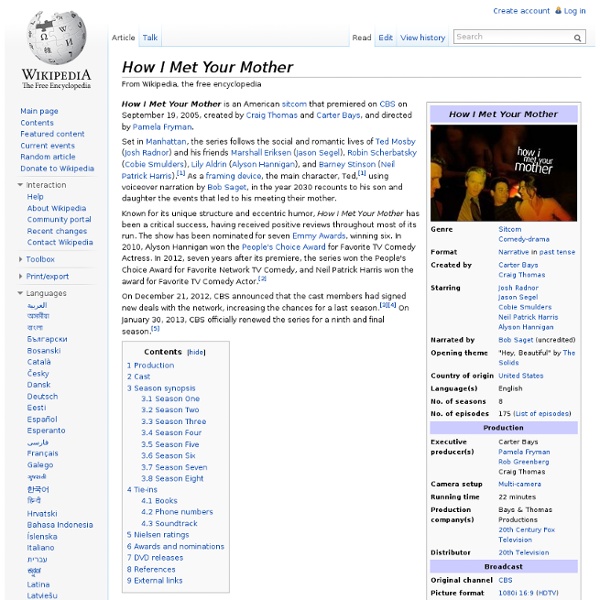The Big Bang Theory
Over time, supporting characters have been promoted to starring roles: Leslie Winkle, a physicist colleague at Caltech and, at different times, a lover of both Leonard and Howard; Bernadette Rostenkowski, Howard's girlfriend (later his wife), a microbiologist and former part-time waitress alongside Penny; neuroscientist Amy Farrah Fowler, who joins the group after being matched to Sheldon on a dating website (and later becomes Sheldon's girlfriend), and Stuart Bloom, the cash-strapped owner of the comic book store the characters often visit. In February 2014, CBS CEO Les Moonves confirmed an eighth season, when announcing the first half of the new season would air on a different night, due to CBS acquiring the rights to Thursday Night Football games. The show will return to its Thursday slot it has held for the past few seasons once the football games end.[9] In March 2014, CBS once again renewed the show for three additional years, through the 2016–17 television season.[10] Production
Sherlock (TV series)
Sherlock is a British television crime drama that presents a contemporary adaptation of Sir Arthur Conan Doyle's Sherlock Holmes detective stories. Created by Steven Moffat and Mark Gatiss, it stars Benedict Cumberbatch as Sherlock Holmes and Martin Freeman as Doctor John Watson. Nine episodes have been produced, the first three of which aired in 2010. Series two aired in 2012, and a third series aired in 2014. The writers said that Freeman's casting developed the way in which Cumberbatch played Holmes.[11] The theme of "friendship" appealed to both Gatiss and Moffat.[24] Gatiss asserted the importance of achieving the correct tone for the character. Rupert Graves was cast as DI Greg Lestrade. Amanda Abbington plays Mary Morstan, Watson's girlfriend and then wife. North Gower Street in London was used for exterior shots of the location of Holmes' "Baker Street" residence[40]
Elementary (TV series)
The show follows Holmes, a recovering drug addict and former consultant to Scotland Yard, as he assists the New York City Police Department in solving crimes. His indifference to police procedure often leads to conflict with Captain Thomas Gregson (Aidan Quinn), although the two still remain mutually respectful of one another. He is accompanied by Watson who initially acts as his sober companion. She is a former surgeon and was hired by Sherlock's father to help him in his rehabilitation. CBS renewed the show for a third season on March 13, 2014.[6] Following his fall from grace in London and a stint in rehab, an eccentric modern Sherlock Holmes relocates to Manhattan, where his wealthy father forces him to live with a sober companion, Dr. Over time, Sherlock finds her medical background helpful, and Watson realizes she has a knack for investigation. Ato Essandoh as Alfredo Llamosa, Sherlock's sober sponsor. Season two was met with equally positive reviews.
Top Gear (2002 TV series)
First run episodes are broadcast in the United Kingdom on BBC Two and (from Series 20) BBC Two HD. From Series 14 until Series 19, prior to the launch of the dedicated BBC Two HD channel, new episodes were also simulcast on BBC HD. The series is also carried on cable television systems in the United States via BBC America, in Latin America via BBC Entertainment and in Europe via BBC Knowledge. Top Gear aired its twenty-first series in 2014 with the series premiering on 2 February and ending on 16 March. The programme has received acclaim for its visual style and presentation, and criticism for its content and often politically incorrect commentary made by its presenters. Jeremy Clarkson, who helped the original series reach its peak in the 1990s, along with producer Andy Wilman, successfully pitched a new format for Top Gear to the BBC, reversing a previous decision to cancel the programme in 2001. In 2008, the series was adapted into a live format called Top Gear Live.
Dexter
Important: You must only upload images which you have created yourself or that you are expressly authorised or licensed to upload. By clicking "Publish", you are confirming that the image fully complies with TV.com’s Terms of Use and that you own all rights to the image or have authorization to upload it. Please read the following before uploading Do not upload anything which you do not own or are fully licensed to upload.
Dexter Daily | Latest News and Season 7 Spoilers
Season Seven - Dexter Wiki
The seventh season of the SHOWTIME series DEXTER premiered September 30, 2012. Following the success of Season Six, seasons Seven and Eight were ordered to conclude the series. Ray Stevenson and Yvonne Stravhoski are special guest stars for this season. Cast Edit Main cast Edit Special Guest stars Recurring cast Aimee Garcia as Jamie Batista (10 episodes) Jason Gedrick as George Novikov (10 episodes) Dana L. Directors John Dahl directed episodes 1, 4 and 11 Steve Shill directed episodes 2, 9 and episode 12 which was the season finale Stefan Schwartz directed episode 3 Ernest Dickerson directed episode 5 Alik Sakharov directed episode 6 Holly Dale directed episode 7 Romeo Tirone directed episode 8 Michael Lehmann directed episode 10 Plot Points from Season 6 leading into 7 Louis Greene the Intern When Dexter rejects the idea, Louis at first feels disappointment...but finds comfort in Dexter's decision and claims that he is finished with games and would rather do something in the "real world". Edit



